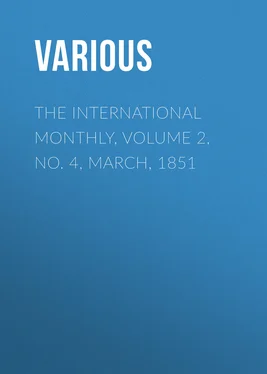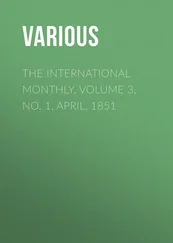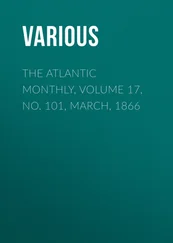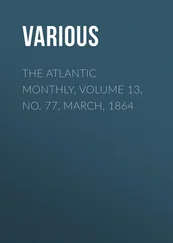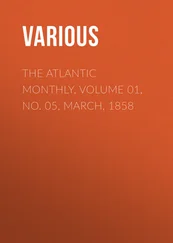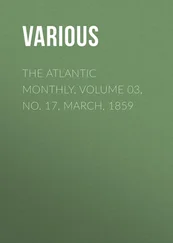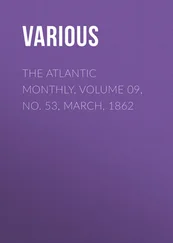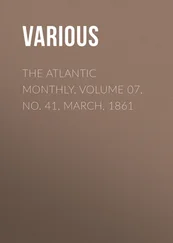Various - The International Monthly, Volume 2, No. 4, March, 1851
Здесь есть возможность читать онлайн «Various - The International Monthly, Volume 2, No. 4, March, 1851» — ознакомительный отрывок электронной книги совершенно бесплатно, а после прочтения отрывка купить полную версию. В некоторых случаях можно слушать аудио, скачать через торрент в формате fb2 и присутствует краткое содержание. Жанр: foreign_antique, periodic, foreign_edu, на английском языке. Описание произведения, (предисловие) а так же отзывы посетителей доступны на портале библиотеки ЛибКат.
- Название:The International Monthly, Volume 2, No. 4, March, 1851
- Автор:
- Жанр:
- Год:неизвестен
- ISBN:нет данных
- Рейтинг книги:5 / 5. Голосов: 1
-
Избранное:Добавить в избранное
- Отзывы:
-
Ваша оценка:
- 100
- 1
- 2
- 3
- 4
- 5
The International Monthly, Volume 2, No. 4, March, 1851: краткое содержание, описание и аннотация
Предлагаем к чтению аннотацию, описание, краткое содержание или предисловие (зависит от того, что написал сам автор книги «The International Monthly, Volume 2, No. 4, March, 1851»). Если вы не нашли необходимую информацию о книге — напишите в комментариях, мы постараемся отыскать её.
The International Monthly, Volume 2, No. 4, March, 1851 — читать онлайн ознакомительный отрывок
Ниже представлен текст книги, разбитый по страницам. Система сохранения места последней прочитанной страницы, позволяет с удобством читать онлайн бесплатно книгу «The International Monthly, Volume 2, No. 4, March, 1851», без необходимости каждый раз заново искать на чём Вы остановились. Поставьте закладку, и сможете в любой момент перейти на страницу, на которой закончили чтение.
Интервал:
Закладка:
Several new Plays and Operas have lately attracted attention in Paris. Paillasse , in five acts, by MM. Dennery and Marc Fournier, produced at the Gaieté in November, was one of the greatest hits during the latter part of 1850. The character of the conventional French mountebank, Paillasse, the vagabond juggler of fairs and streets, was regarded as one of the finest creations of Frederic Lemaitre, and in one of the Christmas revues a symbol of the piece passed before the eyes of the audience as one of the types of the past year. It has since been brought out in London with quite as much success, Madame Celeste (the quondam star of our Bowery ?) in the character of the wife of the mountebank. The musical season at Paris has been signalized by the production of two successful operas. L'Enfante Prodigue of Auber is running a prosperous career at the Académie de Musique . General opinion speaks highly of the music, and the piece appears to be one of the most ingenious of M. Scribe. At the Opera Comique another opera by Scribe and Halevy, La Dame de Pique , has been brought out with success. The libretto , taken from a Russian tale, translated by M. Merimée, is one of the most fantastic Scribe has constructed. It is founded on an old story about the Russian Empress Elizabeth, who had found out the secret of invariably winning at play by means of three cards, of which the Queen of Spades ( la Dame de Pique ) was one.
M. Combet, a Protestant clergyman of Cevennes, has just published at Paris in three volumes a work of great interest and value, under the title of Histoire de France sous le regne de Henry III. par Mazerai . It comprises a full, conscientious and philosophic account of the French religious civil wars, from the beginning of the Reformation down to the establishment of religious liberty under the Consulate. To the original work of Mazerai, M. Combet has prefixed an elaborate introduction, while he has added in the form of an appendix whatever relates to more recent matters, with copious notes and commentaries. The whole constitutes an invaluable contribution to the history of the modern religious movement.
Some new contributions to the history of labor have just appeared at Paris. The most important is the Histoire de la Classe ouvriere depuis l'esclave jusqu'au Proletaire de nos Jours , by M. Robert (du Var), four volumes. Less general and comprehensive in its aim is Le Livre d'Or des Metiers, Histoire des Corporations ouvrieres , by Paul Lacroix and Ferd. Serre, six volumes. Both these books are written without an intention to establish any special theory or system.
The Rev. G. R. Gleig, author of The Subaltern's Furlough, Saratoga , &c., is now Inspector-General of Military Schools, and lives in London.
Leopold Ranke, whose "Lives of the Popes of Rome" is familiar to American readers, has lately discovered in the National Library at Paris an important long lost MS., by the Cardinal Richelieu. In the MS. memoirs of the Cardinal, deposited at the Office for Foreign Affairs, an imperfection has existed, in the total absence of a series of leaves from the most interesting part of the collection. These appear to have been found accidentally, by M. Ranke, in a bundle of papers, gathered from some of the old mansions in Saint Germains. It has been a disputed question whether Richelieu was the real author of the works under his name; whether he availed himself of the literary abilities of others, contributing no more from his own resources than here and there an observation or a fact. These disputes have had reference to the Memoirs, the Testament, and the Histoire de la Mère et du Fils ; for there seems to be good reason for believing that the books published previous to his political elevation, such as the De la Perfection du Chrétien , the theological tracts, and his political treatise of 1614, were written by him with no more than the ordinary aids of authorship. It is possible that the fragment, discovered by M. Ranke, may afford additional evidence on this curious subject, which was lately debated in the Academy.
Of bad spelling George Sand writes, apropos of some newspaper controversy in Paris, that so far from bad spelling being a proof of want of capacity, she has a letter of Jean Jacques Rousseau, in which there are ten faults of spelling in three lines. Moreover, she assures us, that she herself frequently makes a lapsus pennæ for which a school-boy would be chastised.
Lola Montes has made her debut in the literary arena, by the publication in the feuilleton of a daily newspaper of the first portion of what she calls her "Memoirs:" a quasi -impertinent epistle to the ex-king of Bavaria. Since, the publication has been suspended. It promised merely scandal, without wit.
The Count de Montalembert has been elected a member of the French Academy, in place of M. Droz. The election gives little satisfaction outside the Institute; but the Count is not without eminence as a man of letters. Some of his religious tracts are written with great eloquence and pungency.
The seventh and last volume of the Glossarium Mediae et Infimae Latinitatis has just been published by the Didots at Paris. It is a perfect repertory of information as to the middle ages, and cannot be dispensed with by any one who aims to study the institutions, history, and monuments of that period.
A complete grammar of the Coptic language has been brought out at Berlin, by Professor Schwartze.
The Italian Revolution.—Books relating to the late revolution in Italy and the events which preceded it are now published in that country in considerable numbers. One by Farini, Lo Stato Romano dall' anno 1815 all' anno 1850 , not yet completed, only two volumes having been published, will be found valuable to the future historian. Its author is a constitutionalist, and treats the reign of Pius IX. strictly from that stand-point. His book must therefore be read with discretion. With the third volume, which will soon appear, will be issued a second edition of the first two volumes. Marquis F. A. Gualtiero of Orvieto has just brought out at Florence the first volume of a large work, Gli Ultimenti Rivolgimenti Italiani, Memorie Storiche con Documenti Inediti . This is excellent in respect to the pre-revolutionary events, giving a great variety of information as to persons as well as circumstances, in considerable detail. It is to be followed by an account of the revolution itself, treated of course in the same manner. It hardly need be said that the Marquis must fail to do justice to Mazzini and the republicans. An elaborate and able article reviewing the whole question has lately appeared in the Rivista Italiana , from the pen of Signor Berti. One of the best books yet produced on the revolutionary side is General Pepe's Guerres d'Italie .
We noticed last month the anniversary meeting of the Archæological Institute at Rome. The same society has just published its Annals, or Annual Memoirs, for 1850, a volume of great value and interest. It contains Lanza's report on the excavations at Salona, continued down to the year 1848. An essay is contributed by Canina upon the three temples of Pietas, Spes, and Juno Sospita, on whose ruins is built the church of San Nicola in carcere , new remains of the temples having been discovered in 1848. The statue of Apoxyomenos, found a year since at Trastavere, as well as the series of Amazons in relievo now in the British Museum, which Emil Braun takes to be relics of the famous Mausoleum, are treated at length. A little triangular candelabra, found in the Baths of Titus, is made interesting from the relation of the figures upon it to the worship of Apollo. The series of Etruscan frescoes has been greatly enriched by the pictures in two tombs, one of which was discovered in 1846 by A. Francois, while the other was then for the first time copied and rescued from entire oblivion. These pictures, which, like most monumental works, represent funeral feasts and games, according to Braun, are valuable for a mass of details relating to antique athletic art, which were before unknown. A Pompeiian fresco, representing the twelve gods, hitherto little esteemed, is made the subject of a profound investigation by E. Gerhard. Among the essays on vases, a long one by Welcker deserves especial mention. It discusses all the known representations of the Death of Troilus. The sphere of numismatics is filled by a long essay by Cavedoni on the Roman coins of the time of Augustus. There are also many other articles of no less interest to scholars, antiquaries, and artists.
Читать дальшеИнтервал:
Закладка:
Похожие книги на «The International Monthly, Volume 2, No. 4, March, 1851»
Представляем Вашему вниманию похожие книги на «The International Monthly, Volume 2, No. 4, March, 1851» списком для выбора. Мы отобрали схожую по названию и смыслу литературу в надежде предоставить читателям больше вариантов отыскать новые, интересные, ещё непрочитанные произведения.
Обсуждение, отзывы о книге «The International Monthly, Volume 2, No. 4, March, 1851» и просто собственные мнения читателей. Оставьте ваши комментарии, напишите, что Вы думаете о произведении, его смысле или главных героях. Укажите что конкретно понравилось, а что нет, и почему Вы так считаете.
